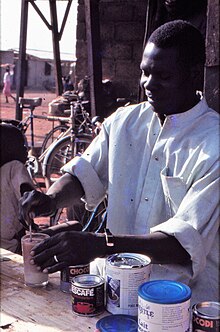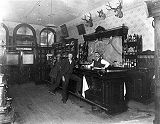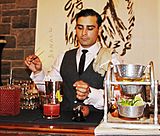A bartender (also known as a barkeep, barman, barmaid, bar chef, tapster, mixologist, alcohol server, flairman or an alcohol chef) is a person who formulates and serves alcoholic or soft drink beverages behind the bar, usually in a licensed establishment. Bartenders also usually maintain the supplies and inventory for the bar. A bartender can generally mix classic cocktails such as a Cosmopolitan, Manhattan, Old Fashioned, and Mojito.
Bartenders are also usually responsible for confirming that customers meet the legal drinking age requirements before serving them alcoholic beverages. In certain countries, such as Canada, the United Kingdom and Sweden, bartenders are legally required to refuse more alcohol to drunk customers.
History
Historically, bartending was a profession with a low reputation. It was perceived through the lens of ethical issues and various legal constraints related to the serving of alcohol.
The pioneers of bartending as a serious profession appeared in the 19th century. "Professor" Jerry Thomas established the image of the bartender as a creative professional. Harry Johnson wrote a bartending manual and established the first bar management consulting agency.
At the turn of the 20th century, slightly less than half the bartenders in London were women, such as Ada Coleman. "Barmaids", as they were called, were usually the daughters of tradesmen or mechanics or, occasionally, young women from the "better-born" classes who had been "thrown upon their own resources" and needed an income.
The bartending profession was generally a second occupation, used as transitional work for students to gain customer experience or to save money for university fees. The reason for this is because bartenders in tipping countries such as Canada and the United States, can make significant money from their tips . This view of bartending as a career is changing around the world, however, and bartending has become a profession by choice rather than necessity. It includes specialized education — European Bartender School operates in 23 countries.
Cocktail competitions such as World Class and Bacardi Legacy have recognised talented bartenders in the past decade and these bartenders, and others, spread the love of cocktails and hospitality throughout the world.
By country
United Kingdom
In the United Kingdom, bar work is often not regarded as a long-term profession (unless the bartender is also the landlord), but more often as a second occupation, or transitional work for students to gain customer experience or to save money for university fees. As such, it lacks traditional employment protections and therefore has a high turnover. The high turnover of staff due to low wages and poor employee benefits results in a shortage of skilled bartenders. Whereas a career bartender would know drink recipes, serving techniques, alcohol contents, correct gas mixes and licensing law and would often have cordial relations with regular customers, short-term staff may lack these skills. Some pubs prefer experienced staff, although pub chains tend to accept inexperienced staff and provide training.
Tipping bartenders in the United Kingdom is uncommon, not considered mandatory but is greatly appreciated by the bartender. The appropriate way to tip a bartender in the UK is to say 'have one for yourself', encouraging the bartender to buy themselves a drink with one's money, where a bartender may instead opt to add a modest amount to a bill to take in cash at the end of their shift.
United States
The Bureau of Labor Statistics data on occupations in the United States, including that of bartender, publishes a detailed description of the bartender's typical duties[7] and employment and earning statistics by those so employed, with 55% of a bartender's take-home pay coming in the form of tips.[8][9] Bartenders may attend special schools or learn while on the job.
Bartenders in the United States may work in a large variety of bars. These include hotel bars, restaurant bars, sports bars, gay bars, piano bars, and dive bars.[10][11] Also growing in popularity is the portable bar, which can be moved to different venues and special events.
Gallery
See also
- Bar-back, a bartender's assistant
- Hospitality
- List of bartenders
- List of public house topics
- List of restaurant terminology
- Tavern
References
- ^ "OLGR > Information and training for students and staff >". Olgr.nsw.gov.au. Retrieved 2015-12-12.
- ^ a b De Mazenod, Anne-Sophie (July 19, 2017). "Barman, un phénomène de mode ?". Le Figaro. Retrieved 12 July 2018.
- ^ Joint Committee on the Employment of Barmaids (1905). Women as Barmaids: Published for the Joint Committee on the Employment of Barmaids. King. Retrieved 1 September2016.
- ^ Lucas, Rosemary (2004). Employment relations in the hospitality and tourism industries. Routledge. pp. 27–42. ISBN 978-0-415-29712-7. Retrieved April 26, 2010.
- ^ "Bartending Salaries from Around the World". Bars and Bartending. 2013-06-02. Retrieved 2018-07-11.
- ^ "Bacardi Legacy Global Cocktail Competition announces The Top 25 | australianbartender.com.auaustralianbartender.com.au". Australianbartender.com.au. 2013-10-16. Retrieved 2015-12-12.











1 comment:
“It was a pretty cool job. It wasn’t with a lot of young people but we had regulars at the bar all the time. I talked golf with them, they tipped well, very well since most of the people at the country club were pretty well to do.
Bartender Service in Amritsar
Post a Comment